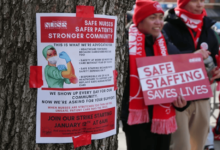Demand for more protection for nurses raising concerns

The government must introduce more support for nursing staff who wish to raise concerns at work, members of the Royal College of Nursing (RCN) have urged.
During RCN Congress 2024, being held in Newport this week, members backed a motion which aimed to protect nurses who want to raise concerns, to ensure they are not ignored or reprimanded when they do.
“Protection for nursing staff to speak out is insufficient”
Samantha Spence
The RCN Outer North West London Branch, which submitted the motion, warned that the reality of speaking up was not always easy, with many nurses facing consequences for doing so.
Samantha Spence, a registered nurse and health visitor representing the branch, said that often nurses “pay a really heavy price” for raising concerns.
“Many find themselves forced out or victimised,” she noted.
Ms Spence said that the Francis report into failings at Mid Staffordshire NHS Foundation Trust, as well as the recent Infected Blood Inquiry, revealed that healthcare workers routinely try to raise concerns but are met with resistance by their organisations.
“Multiple reviews highlight time and time again that harm would have been prevented if concerns that had been raised had been listened to and acted on,” she explained.
“Despite this, those who tried to speak up often find themselves victimised.
“Protection for nursing staff to speak out is insufficient to protect those who are speaking out and prevent the next big scandal.
“Personally I think it’s time to lobby for a different approach that supports our nursing staff in raising concerns, independent of our employer and in a safe way to ensure that these lessons do not keep being repeated.”
The latest NHS Staff Survey in England found that 44% of registered nurses and midwives reported that they had seen errors, near misses or incidents in the last 12 months that could have hurt staff and patients.
Positively, some 90% of nurses and midwives said their organisation encouraged them to report these incidents, while 73% said their organisation would take action to ensure it does not happen again.
However, Ms Spence warned that formal support for those who wanted to speak out “differs across different NHS countries”.
This was recently echoed by the national guardian for the NHS, Dr Jayne Chidgey-Clark, who said there had been variation around the speak up guardian role across NHS trusts.
Natasha Green, member of the RCN students committee, told RCN Congress that many student nurses did feel they could raise concerns on placement.
She added: “We learn from nurses, we learn from HCAs and we do see bad practice.
“Yet we can’t raise that as a concern, without that pressure from universities, without the threat of fitness to practise or reduced hours which means we have to do a retrieval placement.
“It’s not just our nursing staff [who need support in raising concerns] – it’s from the time we begin our degree, to the time we retire.”
This was also echoed by Danny Fenton, a student ambassador, who called for the resolution to offer “greater support and protection to the student nurses in the RCN”.
He said: “Far too often, when we are on placement and we do see bad practice, even if we raise something we’re unsure about, the very first words that often come back to us are ‘you’re just a student’, or ‘don’t raise anything’.
“So this resolution should also support the protection of student nurses.”
Becky Thomas, a non-voting RCN member, said psychological safety was the “cornerstone” of all that nurses do and was “crucial” in creating conditions in which staff feel they can speak up.
“The Royal College of Nursing should lobby government for support for nursing staff raising concerns, for several key reasons,” she said.
“By lobbying for this support, the RCN Council can help create a safe, more effective and more supportive working environment for nurses, benefitting both healthcare providers and patients.
“Silence is not safe, speaking up is.”
The resolution to lobby UK governments for more support for nursing staff raising concerns was passed by the majority of RCN voting members.
Later the same day, the RCN launched its new UK general election manifesto 2024, laying out the college’s demands on the parties standing in the election on 4 July.
One of the calls to action listed in the manifesto was for “legal protection for people raising concerns about unsafe staffing”.







